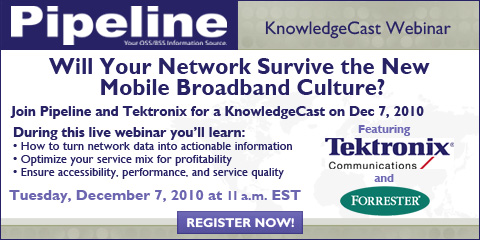|
|

By
Phillip J. Britt
Business combinations and business expansions continued to dominate BSS/OSS developments in the last month even as most other businesses in the global economy continued to struggle.
CSG Systems International Inc.’s planned purchase of Intec Telecom for approximately $372 million announced in late September, while eliminating one of the OSS/BSS competitors, still leaves a very fractured market, with more than 90 firms offering services, according to Karl Whitelock, senior consulting analyst for Stratecast, a division of Frost & Sullivan.
“There are more than 90 players; the are a number of regional and a number of specialized players,” Whitelock said. “But the top 10 control more than 90 percent of the market.”
The combined business will have some
new customers announced after the
purchase as Intec unveiled wins in
|
|
Business combinations and business expansions continued to dominate BSS/OSS developments. |
|



systems aren’t completely at fault. The
first thing people have to do is look at
what the data plans do and don’t
cover. Even when companies offer ‘all
you can eat’ plans, there are a lot of
exceptions.
|
|
|
|
|

Malaysia and the U.S. Whitelock said
those deals were all but signed before
the acquisition announcement. Even
so, in mid-October, Kaufman Bros.
analyst Karl Keirstead lowered his
rating to “hold” from “buy” in a note to
clients, saying the deal may be
defensive in nature, citing upcoming
renewals of large CSG contracts in the
cable sector.
Billing Issues Hit Verizon
Billing issues abound during the last month. Verizon Wireless agreed to pay more than $50 million, which translates to $2 to $6 per affected customer, for data sessions they did not knowingly initiate. Some of these charges were for opening mobile Web links or for accidentally hitting a data access button on the phone. Customers were charged even if no data was received.
According to the company, “the majority of the data sessions involved minor data exchanges caused by software built into their phones.”
The announcement “exposes a number
of things,” according to Whitelock.
“Carriers have worked closely with
billing system suppliers; they are very
sophisticated in the way that the billing
plans are constructed. You have to
read the fine print. The [billing]
|
|

Verizon announced the settlement just prior to the company announcing that it would launch its 4G LTE network in 38 major metropolitan areas and more than 60 airports this year. The 4G LTE network launch will cover more than 110 million rural and urban Americans, right from the start, the company said.
While this will provide faster connections to those who have 4G capable devices on the Verizon network, Whitelock doesn’t expect any big shift uptick in business for Verizon from 4G until the carrier provides deeper network penetration than with the initial LTE launch. He added that initial LTE launch wouldn’t be enough by itself to drive Apple to start providing iPhones and iPads that would operate on the Verizon network.
“You don’t want to lose service when you go from place to place,” Whitelock said. “You don’t want to have it in Atlanta, lose it when you go to Austin for a meeting, then have it again when you come back through Dallas. I think it would be a marketing nightmare.”
More likely would be Apple devices that would use a hybrid baseband controller that would be capable of handling both GSM (for AT&T) and CDMA transmissions, which could be available in 2011, according to Whitelock.
|
|
|







